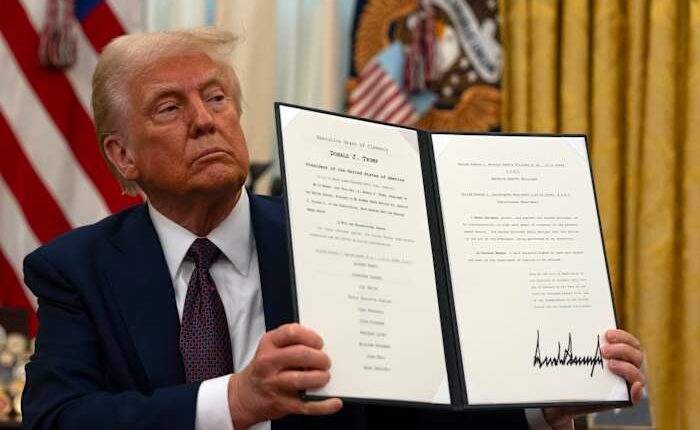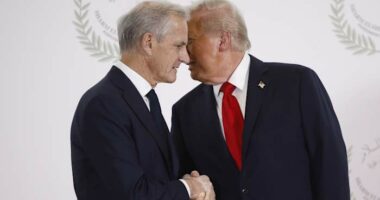Share this @internewscast.com

CHICAGO – According to an Associated Press review, multiple judicial nominees chosen by President Donald Trump have expressed anti-abortion sentiments, linked with anti-abortion organizations, or supported abortion restrictions.
Several have defended state-level abortion limitations in legal settings, with some participating in cases of national significance, such as those affecting access to abortion medication.
Although Trump has stated that abortion-related issues should be managed by the states, these nominees, assuming lifetime judicial roles, could influence abortion rights long after Trump’s presidency.
Trump has been inconsistent on abortion
Trump has repeatedly shifted his messaging on abortion, often giving contradictory or vague answers.
Prior to his latest presidential bid, Trump had expressed support for a federal prohibition on abortions past 20 weeks of gestation and indicated potential backing for a nationwide ban around 15 weeks. However, he eventually advocated for state-level decision-making on abortion matters.
Throughout his campaign, Trump has fluctuated between boasting about appointing Supreme Court justices who contributed to overturning Roe v. Wade and adopting a more balanced approach. This strategy aims to reconcile the political division between his anti-abortion base and the wider public, which generally supports abortion access.
Many nominees have anti-abortion backgrounds
One of Trump’s nominees described abortion as a “barbaric practice,” while another labeled themselves a “zealot” of the anti-abortion cause. A nominee from Tennessee argued that abortion requires distinct consideration, noting that “this is the only medical procedure that terminates a life.”
One from Missouri spread misinformation about medication abortion, including that it “starves the baby to death in the womb” in a lawsuit aiming to challenge the Food and Drug Administration’s approval of the abortion pill mifepristone.
Legal experts and abortion rights advocates warn of a methodical remaking of the federal courts in a way that could pose enduring threats to abortion access nationwide.
Bernadette Meyler, a professor of constitutional law at Stanford University, said judicial appointments “are a way of federally shaping the abortion question without going through Congress or making a big, explicit statement.”
“It’s a way to cover up a little bit what is happening in the abortion sphere compared to legislation or executive orders that may be more visible, dramatic and spark more backlash,” she said.
The nominees represent Trump’s ‘promises’ to Americans, White House says
Harrison Fields, a White House spokesperson, said “every nominee of the President represents his promises to the American people and aligns with the U.S. Supreme Court’s landmark ruling.”
“The Democrats’ extreme position on abortion was rejected in November in favor of President Trump’s commonsense approach, which allows states to decide, supports the sanctity of human life, and prevents taxpayer funding of abortion,” Fields said in a statement to the AP.
Trump focused primarily on the economy and immigration during his 2024 campaign, the issues that surveys showed were the most important topics for voters.
Anti-abortion groups, abortion rights advocates respond
Anti-abortion advocates say it’s premature to determine whether the nominees will support their objectives but that they’re hopeful based on the names put forth so far.
“We look forward to four more years of nominees cut from that mold,” said Katie Glenn Daniel, director of legal affairs for the national anti-abortion organization SBA Pro-Life America.
Abortion rights advocates said Trump is embedding abortion opponents into the judiciary one judge at a time
“This just feeds into this larger strategy where Trump has gotten away with distancing himself from abortion, saying he’s going to leave it to the states, while simultaneously appointing anti-abortion extremists at all levels of government,” said Mini Timmaraju, president of the national abortion rights organization Reproductive Freedom for All.
Copyright 2025 The Associated Press. All rights reserved. This material may not be published, broadcast, rewritten or redistributed without permission.









